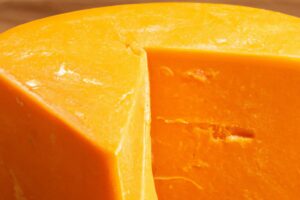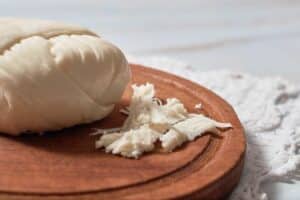Fontina is a unique and delicious cheese that is prized for its nutty, buttery taste and excellent melting ability. However, it’s not always readily available. Luckily, you can achieve similar results with fontina cheese substitute such as Emmental, gruyere, parmesan, mozzarella, and Havarti cheese.
Fontina is an Italian cow’s milk cheese usually used in fondues, sauces, dips, and other dishes that require soft, gooey cheese. On its own, it can range from hard to moderately soft, depending on how long it is aged. But when heated, fontina becomes deliciously gooey, hence its application in softer, more liquid recipes.
Each of these substitutes has unique qualities that help you get close to the experience of fontina. While you aren’t guaranteed to find fontina at your local grocery store, you can achieve a similar result with one of these substitutes.
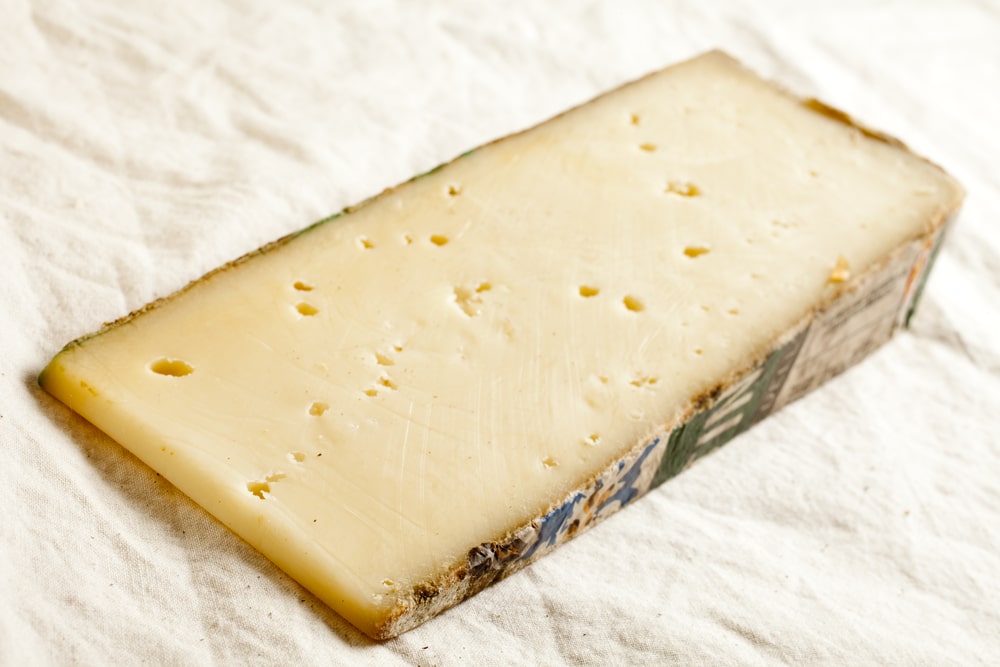
5 Recommended Fontina Cheese Substitute
These top five fontina substitute have made the list largely because of similarities in taste, texture, and cooking application.
Some may work better than others for a particular recipe, so be aware before you pick one! Below, we’ll discuss each substitute and the qualities that make it a good swap for fontina.
Emmental Cheese

Emmental is a hard cow’s milk cheese that most of us know as Swiss cheese. It is semi-hard in consistency and is often recognized by the characteristic holes throughout.
Why Should You Use Emmental in Place of Fontina?
Emmental is an excellent substitute for fontina for many reasons. Both kinds of cheese are semi-hard and made from cow’s milk, resulting in a somewhat nutty, mild flavor.
Emmental is significantly sweeter than fontina and has a stronger aroma. Aside from that, however, the two types of cheese are surprisingly similar in taste and texture, even sharing the characteristic of holes throughout the cheese.
How to Substitute Emmental for Fontina
There is no exact science to substituting Emmental for fontina. Because of the similarities in consistency and texture, you should not need to make any conversions for the amount of cheese you need. Simply swap out the fontina for Emmental in a 1:1 ratio.
Best Use Cases and Recipes
Emmental melts very well and is similar to fontina in this respect. If you are making a sauce, dip, or fondue that calls for fontina, Emmental is a good substitute that will achieve a similar taste and texture.
If you can’t find emmental cheese but need something similar, check out list of best emmental cheese substitute.
Gruyere Cheese
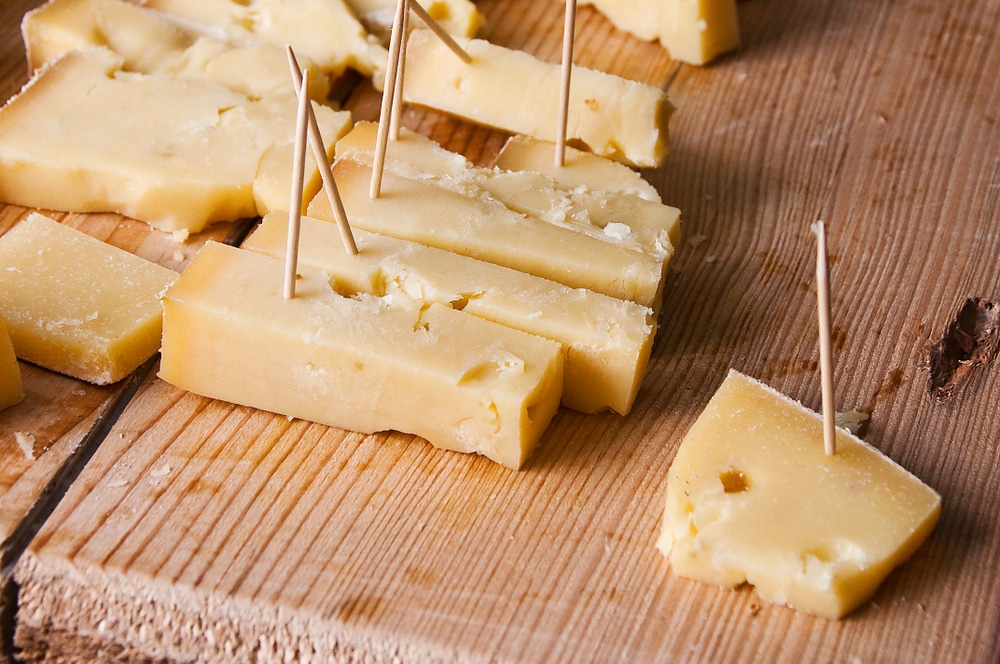
Gruyere is a Swiss cheese that has a remarkably similar flavor to fontina, especially aged fontina. It is known for having a mild, buttery flavor. Like fontina and Emmental, it also has different holes throughout.
Why Should You Use Gruyere in Place of Fontina?
Gruyere is one of the closest matches you can get to the flavor of fontina, though the texture is not identical. Gruyere has a very rich, mild taste that is highly similar to aged fontina. It also melts very well, though it results in a slightly different texture.
How to Substitute Gruyere for Fontina
As with Emmental, you can substitute gruyere for fontina in a roughly equal amount. Because gruyere is more substantial and has a more rigid texture, you may want to use slightly less cheese than what the recipe calls for. Cut it down to somewhere between ¾ and 4/4 of the fontina amount as a rule of thumb. It doesn’t have to be exact, especially if the cheese is not the dish’s main component.
Best Use Cases and Recipes
Because gruyere has a noticeably harder, denser texture than fontina, it works best as a substitute for the cheese in dishes where it is not the main component.
In other words, it is a good swap in recipes like casseroles, pasta, or soup but probably won’t be as well suited for fondue. You may be able to substitute gruyere for fontina in a sauce.
In general, because of the texture differences, it is best to use gruyere in recipes where you don’t need to melt it or in recipes that call for aged fontina (due to the closer taste).
Can’t find gruyere cheese? See our article on gruyere cheese substitute.
Parmesan Cheese
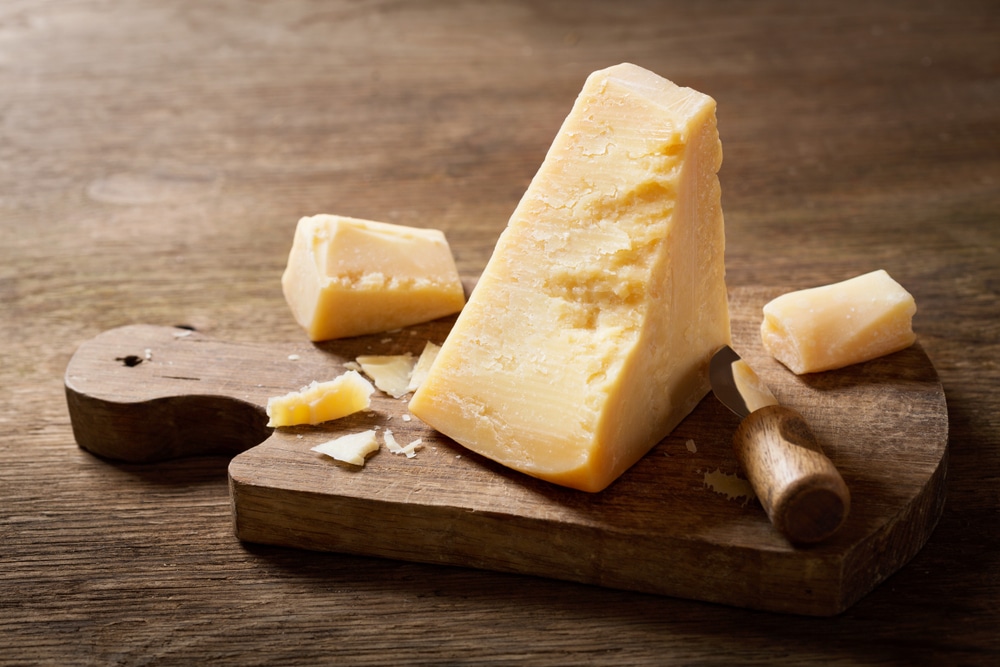
Parmesan — and its close relative, Grana Padano cheese — makes another good substitute for fontina. This beloved hard cheese is widely available for most of us and is easy to use.
Why Should You Use Parmesan in Place of Fontina?
Parmesan’s main benefit as a substitute lies in its flavor. Its slightly sharp but also sweet and nutty flavor is a good swap for fontina, though the two kinds of cheese are very different in texture.
How to Substitute Parmesan for Fontina
When swapping out fontina for parmesan, remember that the two types of cheese have different textures. You may need to use a lot more parmesan in a recipe since it is denser and harder. Pay attention to the type of parmesan you use — fresher, grated parmesan melts more efficiently than other types.
Best Use Cases and Recipes
Like gruyere, parmesan is best used to complement a dish, not as a main component. It tends to be absorbed when it melts, so it is not a good idea for a fondue. Instead, use it as a raw component or incorporate it into soups, pasta, and sauces.
Can’t find parmesan cheese? See recommended parmesan cheese substitute.
Mozzarella Cheese
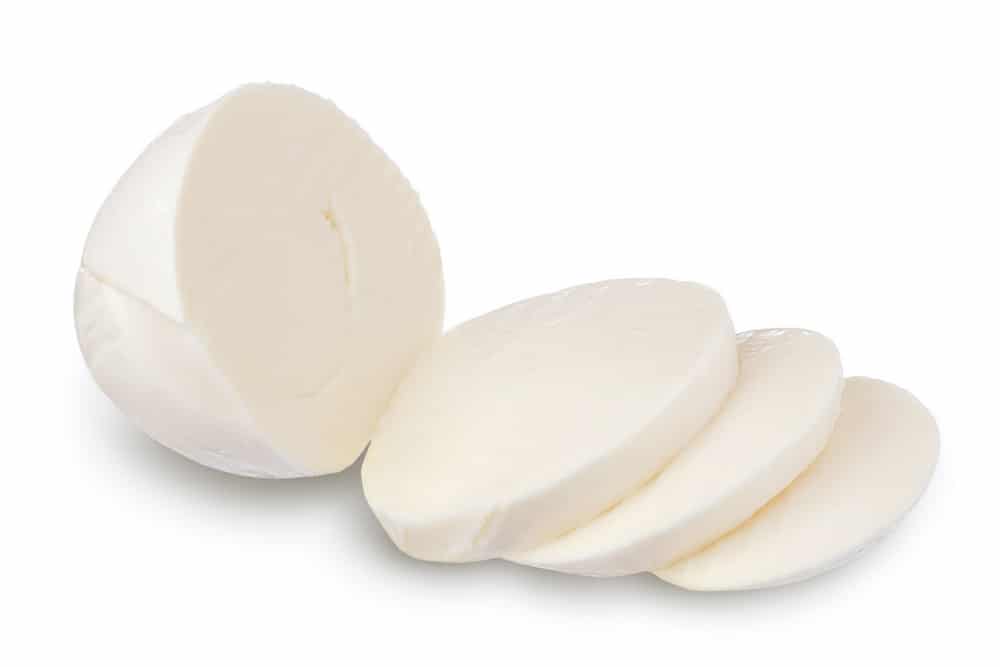
Mozzarella is an excellent substitute for fontina because of its similarity in taste as well as its wide availability.
Why Should You Use Mozzarella in Place of Fontina?
People who are familiar with cheese might raise their eyebrows at the idea of substituting mozzarella for fontina since they have incredibly different textures. While fontina is medium-hard to hard, mozzarella is exceptionally soft.
However, its suitability as a substitute lies in its similar taste and melting ability.
How to Substitute Mozzarella for Fontina
Since mozzarella and fontina are so different in texture, you can rely on this substitute to make up the bulk of any recipe where the cheese is the main or one of the main components, such as sauce or fondue.
Best Use Cases and Recipes
Stick to using mozzarella in recipes with melted cheese. Melted, its taste and texture will be very close to that of fontina.
See: Mozzarella cheese substitute
Havarti Cheese
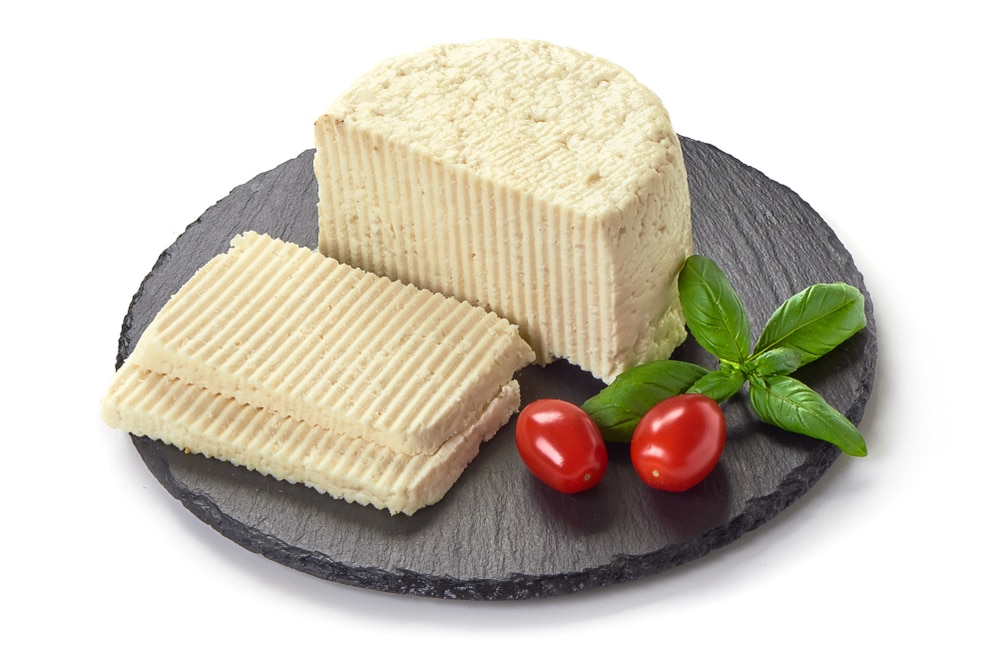
Havarti is a Danish cow’s milk that is highly similar in taste and texture to fontina. The two types of cheese come from regions that are close to one another!
Why Should You Use Havarti in Place of Fontina?
Havarti cheese is one of the closest kinds of cheese to fontina! In terms of both taste and texture, the two types are incredibly similar. The main difference is that Havarti is slightly softer; however, this is so slight that it doesn’t make any practical difference in cooking.
How to Substitute Havarti for Fontina
Since the two types of cheese are so similar in texture, taste, density, and other elements, there is no real trick to substituting Havarti for fontina! Simply replace the cheese in a 1:1 ratio.
Best Use Cases and Recipes
Thanks to Havarti’s similarity to fontina, it is well-suited to almost any recipe! You can substitute it in sauces, soups, pasta, casseroles, and much more. It will melt well and also serves as a good sub when served cold.
Can’t find havarti cheese? See recommended substitutes for havarti.
Frequently Asked Questions
Let’s review some of the frequently asked questions about fontina.
There are many types of fontina. These vary in color, texture, hardness, age, and origin. Classic fontina hails from Italy. It is made from unpasteurized cow’s milk and is usually aged about three months before eating.
However, even classic fontina can vary in some aspects, usually based on how long it is aged. The short answer is yes; there are many types of fontina!
Fontina is often compared in taste and texture to gruyere cheese, and they are similar enough that we’ve included gruyere on this list as a substitute!
There are a few significant differences. First, gruyere, while it has a similar nutty taste, is a bit sharper. This is easy to notice if you are using more aged gruyere.
While gouda can be used as a substitute for fontina, it is not particularly similar in taste or consistency.
Both kinds of cheese are made with cow’s milk, but gouda has a significantly harder texture, sharper taste, and brighter color than fontina. Its suitability as a fontina substitute despite these differences lies mainly in its extreme versatility.
Fontina cheese has many uses, but it is especially prized in fondue and other similar dishes. It is a perfect melting cheese, adopting a soft, gooey texture when heated. You will find fontina used in fondues, sauces, and dips or incorporated into pizzas and other dishes.
Fontina cheese is not bitter. While the many types vary in flavor and texture depending on how long they are aged, fontina’s taste is usually described as thick, creamy, rich, and mild.
As it ages, fontina tends to develop a nutty flavor, which some cheesemakers emphasize.



